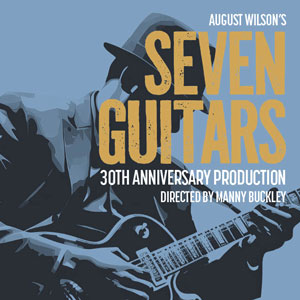
 **** City Lit’s 30th anniversary production of August Wilson’s play “Seven Guitars” is skillfully directed by Manny Buckley. The story takes place in the year 1948 and “follows six friends mourning the death of their friend Floyd ‘Schoolboy’ Barton (Jordan Gleaves), a rising blues star trapped by his circumstances and cut down in his prime.”
**** City Lit’s 30th anniversary production of August Wilson’s play “Seven Guitars” is skillfully directed by Manny Buckley. The story takes place in the year 1948 and “follows six friends mourning the death of their friend Floyd ‘Schoolboy’ Barton (Jordan Gleaves), a rising blues star trapped by his circumstances and cut down in his prime.”
Basically, we witness a series of flashbacks about the particular circumstances that precede Floyd’s death. Yet for a long time, we are unsure if the story is leading up to a larger plot (like solving a death investigation) or whether the banter among the characters is simply a representation of the cultural milieu of the black community in the Hill District, of Pittsburgh, Pennsylvania. What we cannot help but notice is how all the characters’ lives have been affected by racial segregation. We see how each one wants to escape poverty and discrimination in their own way and gain some measure of control over their life’s direction. Going to a club at night becomes one way for both men and women to forget their troubles. But most importantly, the play raises the issue of what it means to be a man in the African American community when one is being emasculated by white people.
Floyd, a singer-songwriter and guitarist, sees his ticket to success by becoming a recording artist. Having a second record under the same (white-owned) record label is in the works, and he wants to travel to Chicago to record his next song. To his mind, music and the music industry seems like one way to bridge the racial divide in terms of a black man gaining some measure of accomplishment and income, and he wants a lovely woman in the name of Vera (Maureen Azzun) on his arm. But Floyd’s buddy Canewell (Jarvell Williams) reminds him that despite seeming successes, a black man is always seen as being black first, even in a city like Chicago (which is assumed to be somewhat more liberal concerning race relations than Pittsburgh or the South). Apparently both men have, at some point in their lives, been arrested on trumped up charges, and Floyd has spent some time in jail. As Red (Brian Bradford) puts it: “You can be arrested for having too much money in your pocket or not enough.” Other characters include Hedley (Robert Howard), a cook who walks with a limp and has a perfect Caribbean accent to boot. There is also Louise (Andrea Conway-Diaz), who proves to be Vera’s best friend and confidante. Ruby (Tiffany Williams) is the last of the characters to arrive on set, and she is rather promiscuous with a particular affinity towards Red. There is also the part of the radio announcer (Mike McShane) and the voice of Floyd’s mother (Marquetta Jackson).
Excellently done is the costume design by Rachel S. Parent. I especially liked Floyd’s blue suit, Canewell’s brown striped suit, Vera’s navy blue dress with the lace collar, Louise’s dress in a pretty shade of green, and Ruby’s dress with the sweetheart neck and red and white shoes. Red is always dressed with some item in red, such as the underside of his hat! Everybody is appropriately coiffed for the 1940s era too. Special recognition must be made to intimacy coordinator Chels Morgan for scenes that involve kissing and close contact among the actors and also to violence designer Micah Figuero.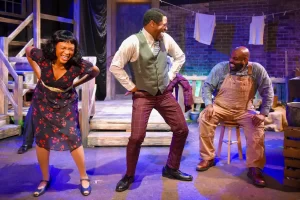
A multi-purpose set designed by Milo Bue is done well. A series of wooden planks, wooden steps, and screen doors gives us the feeling of being in the backyard of a boarding house, and this works well with the directing. Lighting to demarcate scenes is Mike McShane’s province. Props by prop master Jeremiah Barr include furniture, an outdoor grill, and the like, which change during the course of the performance to provide the illusion of going forward in time. Two guitars are also included. This begs the question of why this play is called “Seven Guitars” when we only see two on stage. It’s because there are seven characters in this story—and seven birds perched on a wire. Each one is tuned to its own pitch and wants to fly. Chicken feathers portend events to come. Then there is the sound design by Warren Levon. Especially significant is the crowing of the rooster, a symbol of male dominance and fertility, which (spoiler alert) is killed during the course of the play.
This show contains a lot of dialogue that sometimes seems a bit drawn out. When lots of subjects are brought up, we might start to get lost in the minutiae. But what might initially seem to be superfluous information becomes important by the end. All of this gets tied together as we develop a larger picture of the intersection between the effects of race and institutional racism on African American ambition and manhood. But being a man is not a monolith. Some men are “more acceptable” as lovers and spouses than others, as evinced by the situation with Ruby, who is pregnant and makes the choice of which of three men she states to be the father of her baby. That is one way that she establishes her own independence within the circumscribed role of being a woman. Then too, there are a few characters who are discussed but who have never been present during the course of the show; this plus an additional theme have been added near the end. While following this new material might initially seem a bit confusing, it becomes necessary to resolve the plot in more ways than one. And I don’t want to give anything away.
All that being said, it is Robert Howard’s winning performance in the role of Hedley that makes today’s production so memorable and why I recommend it so highly. The energy shifts every time he takes the stage, like a breath of fresh air. He does a phenomenal job showing us how his character changes over the years: from the time he prepares food and dreams of owning his own plantation to the moment when his eyes bulge out and he’s down on the floor.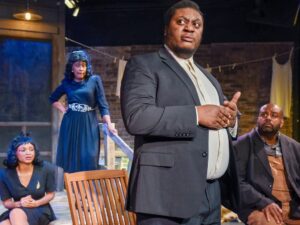
Now see the show for yourself, and you can decide what you think!
“Seven Guitars” runs through December 1, 2024, at City Lit Theater, 1020 W. Bryn Mawr, on the second floor of the Edgewater Presbyterian Church (accessible via elevator).
Tickets – $35
Seniors – $30
Students and military – $12
Performance schedule:
Fridays and Saturdays at 7:30 p.m.
Sundays at 3:00 p.m.
Mondays, November 18 and 25 at 7:30 p.m.
For more information and to purchase tickets, visit https://www.citylit.org/ or phone 773-293-3682.
To see what others are saying, visit www.theatreinchicago.com, go to Review Round-Up and click at “Seven Guitars”.


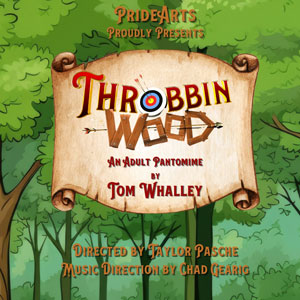


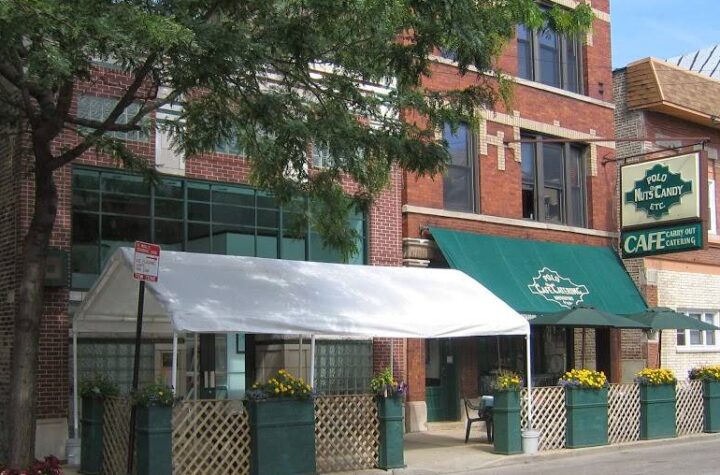
More Stories
“Throbbin Wood” reviewed by Julia W. Rath
“Royko: The Toughest Man In Chicago” revisited review by Julia W. Rath
“Falsettos”